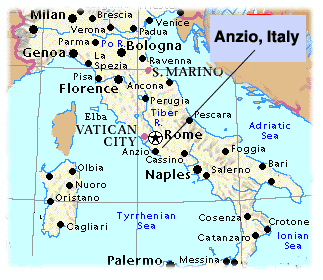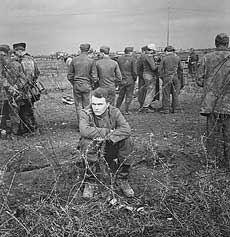|
At look back at the place and times that brought an untimely end to life of Eric Fletcher Waters, and the place that ultimately inspired The Wall By Rick Karhu
Anzio, Italy is a seaside resort town about 30 miles to the south of Rome with a population in the early 80s of more than 27,000. Anzio is a town rich in history that stretches back further than the bloody role it played in World War II. Around 340 BC, Anzio was conquered by Rome after which it became a favored year-round resort for the more wealthy element of the growing Roman Empire. Anzio is the birthplace of both Emperors Nero and Caligul. In the middle ages, it was sacked and left in ruins by the Saracens and was not rebuilt until the late 17th century. During the second World War, American, Canadian and British troops landed at Anzio beach. This was the notorious morning in black '44 that so many Floyd fans are familiar with. It was Jan. 22, 1944 that saw the start of a campaign that would eventually prove successful, but not without the loss of so many "ordinary lives." Stand and Fight
The fight that started in Anzio would not be brought to a close until nearly six months later, on June 4 when the Allied troops managed to finally break through the German lines and take Rome. The plan was simple: land at Anzio and drive the troops across the 50 kilometers directly into Rome to seize the capitol. The Allies had the element of surprise on their side, but the Germans were quick to respond. The response left the Allied troops surrounded by overwhelming German force on a small beach head for three months where they were easy prey for the enemy. Some of the most moving accounts of the battle are from soldiers who literally saw their friends die during this time. By most firsthand accounts, the three, grueling months trapped at Anzio were nothing short of a slaughterhouse. Surprisingly, the Allied commanders did not back down from the onslaught, and although some accounts of these events seem to indicate that the mission was a failure, it was in fact a success. With some re-enforcements, the Allies were able to eventually break through the powerful German perimeter and drive the enemy from the city and eventually into a northern retreat. Needless to say, it's easy to understand the anger of a child made fatherless by such a relentless and almost senseless strategy on the part of the Allies. The fact that it succeeded at all seems incredible. The exact body count at Anzio is unknown. According to descriptions, many unidentified graves are scattered across the beaches of Anzio to this day.
Oh, gather 'round me, comrades; and listen while I speak
Praise be to God for this captured sod that rich with blood does seep.
. . . Audie Murphy, 1948 Sources: http://www.angelfire.com/wa/warpoetry/Thecrosses.html Rick Karhu is Editor of Spare Bricks |


